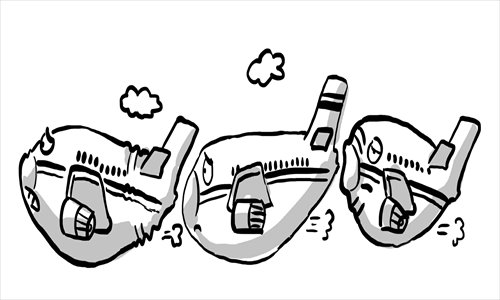China’s airplanes need a bigger slice of sky to avoid worse reputation

Illustration: Liu Rui/GT
Since early July when FlightStats, a credible global flight tracker, ranked the Chinese mainland's airports as the worst in the world in terms of on-time departures and arrivals, the punctuality of flights has been a hot topic among the Chinese public.
The Civil Aviation Administration of China (CAAC) has decided to take action. At the end of July, the authorities introduced a new policy to guarantee more flights would take off on time. This policy applies to eight of China's busiest airports in Beijing, Guangzhou, Shenzhen, Shanghai (two airports), Chengdu, Kunming and Xi'an.
According to the Beijing News, the new policy states that as long as weather and military activities permit, and both the departure and the arrival airports are within the eight concerned, flights are free from air traffic flow control before 10 am each day. This new policy, as the authorities state, will help passengers "reduce time wasted while waiting for takeoff once on board the plane."
Suspicions went rampant once the policy came into effect. People criticized it for increasing the risk of accidents.
According to them, previously flights were not allowed to leave the departure airport if the arrival airport was not certain of ensuring a safe landing. But now, it is possible that a flight that leaves on time will not arrive as expected. Many people would rather wait on the ground than waiting to land once up in the air. What's more, the increasing uncertainty of whether planes can land as expected is likely to cause more problems.
On the one hand, when a plane is running out of fuel but still waiting for permission to land, it has to choose an alternate airport. This means airports near these major hubs will be disturbed by unexpected landings.
On the other hand, "waiting in the air" will require more fuel. The cost will have to be borne by the airlines and the consumers alike.
According to Zheng Hongfeng, who was an insider of the civil aviation system and now the CEO of veryzhun.com, the passenger traffic at these eight airports accounts for 47 percent of nationwide air traffic. It might be true that the authorities have realized the imperativeness of reforming China's civil aviation and decided to let the busiest airports take the brunt, but the measure seems more like a face-saving effort.
There is also a flow of statistics that has made many people suspect its authenticity.
It is reported that in China, 42.3 percent of flight delays were attributed to bad operations by airlines, while poor airport flow control and military activities only accounted for 26.1 percent and 7 percent. But many insiders of civil aviation industry point out that the statistics are not in accordance with the real situation.
The crux probably lies in whether more airspace could be opened up to civil flights. According to Li Jiaxiang, head of the CAAC, cited by caixin.com, about 20 percent of China's airspace is available to civil aviation, and the rest is strictly controlled by the military.
While in the US, a country whose airspace is almost the same size of China's but has many more planes and flights, airspace for civil usage makes up 85 to 90 percent.
CAAC statistics show that China is expected to have 4,200 cargo planes and 5700 general aviation aircraft. China's surging demand for more flights and airplanes cannot be handled in such a small section of sky.
Facing the urgent need of a bigger sky, there are signs of adjustment. According to the Xinhua News Agency, China's air force has started to open up low-altitude airspace, and has disclosed more information about temporary routes. It's a good start, but the pace needs to be accelerated to catch up with the airlines' growth.
There has been criticism that inefficient and overly fragmented administration of civil aviation is a major reason why flight delays are so common. But without enough airspace, China's flights cannot be made punctual again.
The author is a Global Times reporter. liuzhun@globaltimes.com.cn